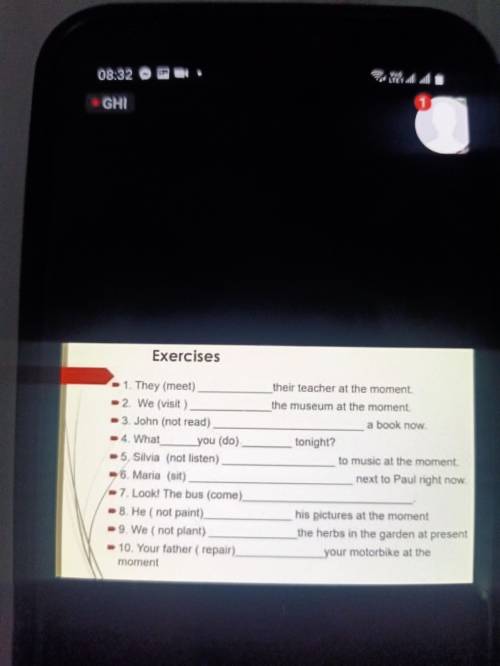1. They (meet) their teacher at the moment.
2. We(visit) the museum at the moment.
3. John (...

English, 12.09.2021 19:50 ahmedislife
1. They (meet) their teacher at the moment.
2. We(visit) the museum at the moment.
3. John (not read) a book now.
4. What you (do) tonight?
5. Silvia (not listen) to music at the moment.
6. Maria (sit) next to Paul right now.
7. Look! The bus (come) .
8. He (not paint) his pictures at the moment.
9. We (not plant) the herbs in the garden at present.
10. Your father( repair) your motorbike at the moment.


Answers: 3
Another question on English

English, 22.06.2019 05:50
How can the reader of a story use the setting of a story to learn more about a charactor
Answers: 1

English, 22.06.2019 06:00
Read the passage from a raisin in the sun. mama: lord have mercy, baby. you done gone and bought your grandmother a hat? travis (very proud): open it! she does and lifts out an elaborate, but very elaborate, wide gardening hat, and all the adults break up at the sight of it. ruth: travis, honey, what is that? travis (who thinks it is beautiful and appropriate): it's a gardening hat! like the ladies always have on in the magazines when they work in their gardens. beneatha (giggling fiercely): travis—we were trying to make mama mrs. miniver—not scarlett o'hara! mama (indignantly): what's the matter with you all! this here is a beautiful hat! (absurdly.) i always wanted me one just like it! which word or phrase from the text best supports the idea that the adults think the hat is inappropriate? “have mercy” (giggling fiercely) (indignantly) “what’s the matter”
Answers: 1

English, 22.06.2019 06:00
In the book hatchet why did brian think searchers would not find him
Answers: 3

English, 22.06.2019 07:00
Read the passage. excerpt from "why equal pay is worth fighting for" by senator elizabeth warren, april 17, 2014 i honestly can't believe that we're still arguing over equal pay in 2014. when i started teaching elementary school after college, the public school district didn't hide the fact that it had two pay scales: one for men and one for women. women have made incredible strides since then. but 40 years later, we're still debating equal pay for equal work. women today still earn only 77 cents for every dollar a man earns, and they're taking a hit in nearly every occupation. bloomberg analyzed census data and found that median earnings for women were lower than those for men in 264 of 265 major occupation categories. in 99.6 percent of occupations, men get paid more than women. that's not an accident; that's discrimination. the effects of this discrimination are real, and they are long lasting. today, more young women go to college than men, but unequal pay makes it harder for them to pay back student loans. pay inequality also means a tougher retirement for women. . for middle-class families today, it usually takes two incomes to get by, and many families depend as much on mom's salary as they do on dad's, if not more. women are the main breadwinners, or joint breadwinners, in two-thirds of the families across the country, and pay discrimination makes it that much harder for these families to stay afloat. women are ready to fight back against pay discrimination, but it's not easy. today, a woman can get fired for asking the guy across the hall how much money he makes. here in the senate, sen. barbara mikulski (d-md.) introduced the paycheck fairness act to give women the tools to combat wage discrimination. it would ensure that salary differences have something to do with the actual job that they are doing, and not just because they are women. senator warren states that the effects of pay discrimination are long-lasting. is this a valid argument supported by accurate evidence? no; warren weakens her point by claiming that the paycheck fairness act would "give women the tools to combat wage discrimination." yes; warren supports her point by noting, "for middle-class families today, it usually takes two incomes to get by." yes; warren supports her point by noting, "pay inequality also means a tougher retirement for women." no; warren weakens her point by noting, "today, a woman can get fired for asking the guy across the hall how much money he makes."
Answers: 1
You know the right answer?
Questions




Biology, 03.01.2020 06:31





Health, 03.01.2020 06:31



Social Studies, 03.01.2020 06:31


Social Studies, 03.01.2020 06:31

Computers and Technology, 03.01.2020 06:31








